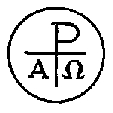
FAIR is a non-profit organization dedicated to providing well-documented answers to criticisms of the doctrine, practice, and history of The Church of Jesus Christ of Latter-day Saints.
| Answers portal |
| God |

|
|
This page is based on an answer to a question submitted to the FAIR web site, or a frequently asked question.
| FAIR Wiki Deutsch |
Some of my non-LDS Christian friends have told me Mormons are polytheists because we don't believe the Nicene Creed. Others say Mormons are polytheists because they believe humans can become gods. Is this an accurate characterization of LDS belief?
Almost invariably when someone claims Mormons are polytheists, they are not seeking a clear explanation of Mormon thought on the nature of God, but are simply using a word with negative connotations in our religious culture as a club to intimidate or confuse others.
There really is not a single word that adequately captures LDS thought on the nature of God. Pertinent key technical terminology includes the following:
Usually the very same people who are pressing the case that Mormons are polytheists are some stripe of Evangelical Christians who claim to be monotheists. But Trinitarians are not Monotheists by definition (just ask a Jew or Muslim).
The facts that the LDS do not believe the Father, Son and Holy Ghost are one in substance, and believe in deification/theosis (that humans may eventually become deified and become partakers in the divine nature), could be used to paint Mormons as in some sense polytheists.
When we examine the technical terminology above, though, it becomes clear that a key point of demarcation is worship versus acknowledgment of existence. If members of the Church worshiped an extensive pantheon like the Greeks or Romans, then the label would be appropriate. In the context of doctrinal differences over the relationship among the Father, Son and Holy Ghost, however, or the doctrine of deification (which is a profoundly Christian doctrine and not just a Mormon one), use of the word "polytheistic" as a pejorative is both inaccurate and inappropriate.
Instead of using a single-word label, one must actually articulate the belief (using fully-developed sentences or paragraphs). The single-word label that will adequately describe the full breadth of LDS thought on the nature of God has yet to be coined.
Any discussion with Jews or Muslims will quickly demonstrate no Christian is, strictly speaking, a monotheist.
One of the chief objections by Jews and Muslims is Christians are polytheists. Most brands of Christians insist on the divinity of Father, Son and Holy Spirit. In addition, the very word those who crafted the great ecumenical creeds used to describe the deity of Jesus, his Father and the Holy Spirit is "trinity," meaning three. Additionally, they insisted the three Persons should not be confounded, as such would be deemed modalism (one of the primary heresies that led to the formation of the ecumenical creeds and various confessions). Modalism often insists the one God merely appears to us in three different ways (i.e., as Father, Son and Holy Spirit), and this is exactly what the creeds deny.
The New Testament has language indicating human beings can put on the divine nature and be called "gods" (see John 10:33, 34; Ps. 82:6, Deut. 10:17, etc.). They are instructed to become one with Jesus just as he is one with his Father. They key point is to realize the existence of other beings with godly attributes has no effect on who Latter-day Saints worship. According to Leff Lindsay, a popular LDS online apologist:
Additionally, there is abundant evidence of deification being taught by various commonly accepted Christians. If belief in theosis makes one a polytheist, many Christians would have to be so labeled - including such figures as C. S. Lewis and John Calvin. Clearly, this is not the way in which the term "polytheist" is normally used, but critics of the Church are often willing to be inconsistent if the Church can be made to look alien or "unChristian."
"Monotheism" is sufficiently broad to include the kind of oneness enjoyed by the Father, Son and Holy Spirit, as well as that promised to those who become one with them when fully sanctified.
Latter-day Saints are not polytheists in any reasonable sense of the term that does not also exclude most other Christians who deny the Modalist heresy. Trying to reduce LDS thought to a simple term or "slogan" in this way distorts LDS doctrine.
The Saints worship one God. There are no competing divinities in whom they put their trust. LDS scripture contains such language (1 Nephi 13꞉41, 2 Nephi 31꞉21, Mosiah 15꞉1-5, Alma 11꞉26-37, Mormon 7꞉7, DC 20꞉28, Moses 1꞉20), but it is qualified in somewhat the same way that Creedal Christians have found a way of saying "three"—as in Trinity—and yet also one.
|
Template:Godwiki Template:JesusWiki

FAIR is a non-profit organization dedicated to providing well-documented answers to criticisms of the doctrine, practice, and history of The Church of Jesus Christ of Latter-day Saints.
We are a volunteer organization. We invite you to give back.
Donate Now